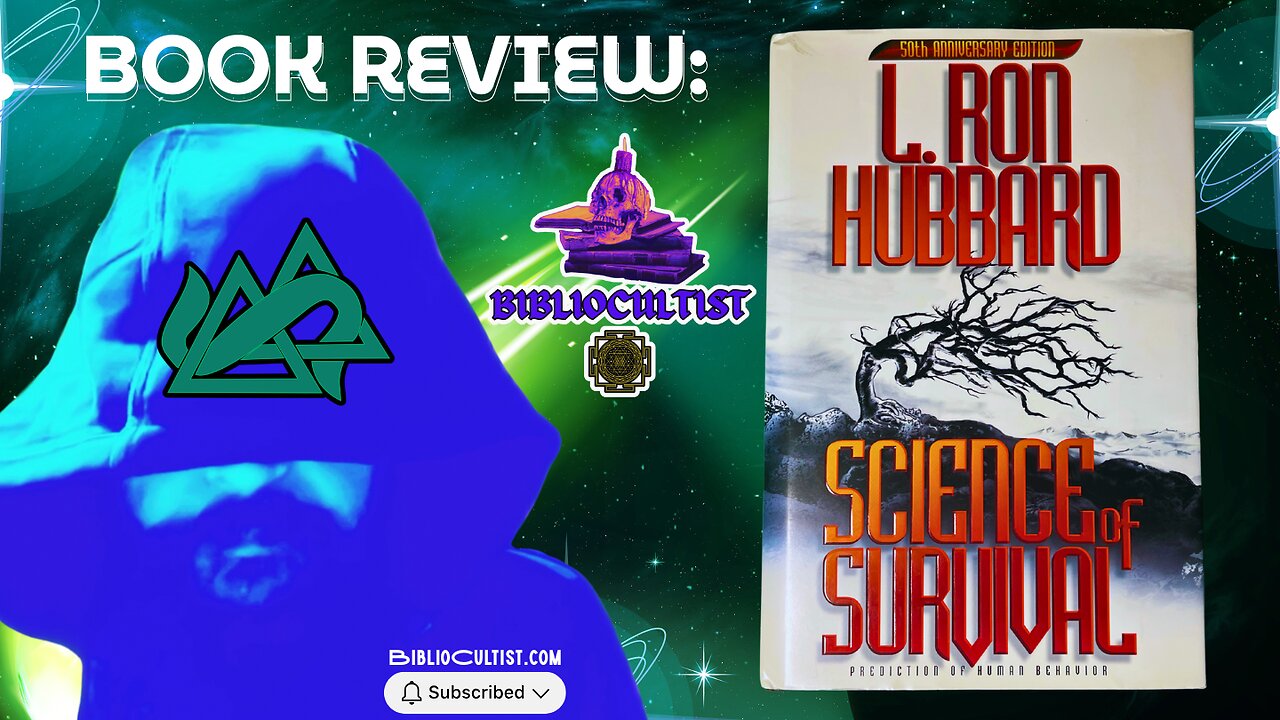Premium Only Content

Beyond the Reactive Mind: Hubbard's Theta Theology in Science of Survival
**DONATE HERE IF YOU WISH TO HELP FUND THIS PROJECT: http://ko-fi.com/bibliocultist**
In this #bookreview, we explore L. Ron Hubbard's seminal work, Science of Survival, and a crucial follow-up to Dianetics. We take a positive look at its core concepts, starting with the brilliant and practical ARC Triangle (Affinity, Reality, Communication) and how it provides a map for understanding human relationships and resolving conflict. We break down Hubbard's fascinating dualistic theology, which divides the universe into the static, creative energy of Theta (thought, life, thetan) and the physical universe of MEST (Matter, Energy, Space, Time). Finally, we discuss a critical evolution in Hubbard's tech: the strategic shift from auditing anyone to the vital importance of the Tone Scale and the policy of not auditing those below a 2.0 (and later, a 3.5). This book isn't just theory; it's a comprehensive system for predicting human behavior and an interesting attempt to achieve spiritual development.
#ScienceOfSurvival #LRonHubbard #Scientology #ARCtriangle #Theta #MEST #ToneScale #Dianetics #BookReview #SelfImprovement #Philosophy #Theology #Dualism #HumanBehavior #SpiritualTech #biblio #cultist #bibliocultist
**SHOW NOTES**
1. L. Ron Hubbard, best known as the founder of Scientology, also holds a place in the Guinness World Records as the most translated and published author in the world. With over 1,084 literary works published—translated into 71 languages—and sales exceeding 100 million copies, his output spans genres from science fiction and fantasy to self-help and philosophical texts.
2. Ontology is the branch of philosophy that studies the nature of being, existence, and reality itself. It asks fundamental questions like: What does it mean to be? What entities exist? How can things be categorized based on their fundamental characteristics? This abstract nature is precisely why ontology tends to confuse people; it is often mistaken for epistemology, which is the study of how we know what exists. While other fields ask "how does it work?" or "how do we know?", ontology asks the more profound and daunting question: "what is it, fundamentally?"
3. In Vedanta philosophy, māyā is the powerful cosmic illusion that veils the true nature of reality, presenting the ever-changing, manifold world as absolute and real. It is not merely "illusion" in the sense of something nonexistent, but rather a creative force—often likened to a magician’s trick—that causes perception to mistake the transient, material world (phenomena) for the ultimate, unchanging reality (Brahman). Māyā operates through duality and differentiation, making the One appear as many, and binding consciousness to names, forms, and limitations.
4. Wokeism is the ultimate luxury of a decadent society—a hyper-sensitivity cultivated not in the struggles of material necessity, but in the artificial comfort of high consumption. It consumes the capacity for critical thought, replacing it with a performance of moral refinement that is, itself, a product to be consumed and displayed, all while the machinery of capital accumulation continues unchallenged.
5. Jack Parsons, the rocket scientist and devoted occultist, channeled the rebellious, experimental spirit of early 20th-century esotericism—blending Thelema, ritual magic, and a futurist vision aimed at shattering societal and cosmic limits. His work embodied a revolutionary impulse to transcend modernity through occult means. This same desire to break with a decaying world, however, took a radically different direction among the Traditionalist thinkers like Julius Evola, René Guénon, and others. They too sought to escape modern nihilism and materialism, but rather than looking forward through transgressive innovation, they turned backward—toward a reactionary recovery of primordial tradition, hierarchy, and sacred order.
6. From a theological perspective, dualism posits a universe fundamentally structured by two opposing, co-eternal principles—typically good versus evil, spirit versus matter, or God versus a counter-deity. This stands in stark contrast to monistic systems like Islam or Advaita Vedanta, which ultimately see all reality emanating from a single, divine source. This framework places Scientology in a camp theologically closer to Zoroastrianism—with its cosmic battle between Ahura Mazda and Angra Mainyu—than to the monistic absorption found in Eastern religions or the absolute sovereignty of the One God in Abrahamic faiths. Hubbard’s dualism thus provides a metaphysical foundation for his soteriology: spiritual freedom is achieved not through union with God, but through the individual spirit's separation from and victory over the material realm.
-
![[Ep 772] No Kings for Weak Minds: Funding & Following | CA Homelessness: Crisis & Scandal](https://1a-1791.com/video/fww1/d8/s8/1/g/j/B/r/gjBrz.0kob-small-Ep-772-No-Kings-for-Weak-Mi.jpg) LIVE
LIVE
The Nunn Report - w/ Dan Nunn
1 hour ago[Ep 772] No Kings for Weak Minds: Funding & Following | CA Homelessness: Crisis & Scandal
162 watching -
 1:18:31
1:18:31
The Culture War with Tim Pool
4 hours agoTim Pool Vs. Liquid Death CEO DEBATE
91.2K110 -
 LIVE
LIVE
Times Now World
18 days agoLIVE Jeffrey Sachs | Netanyahu Turned U.S. Military Into His Own War Machine | Times Now World
39 watching -
 LIVE
LIVE
ahdedazs
41 minutes agoARC Raiders Playtest! *Multistreaming*
13 watching -
 1:58:33
1:58:33
The Quartering
3 hours agoCrowder Roasts Entitled Black Man, Hasan Piker Meltdown, Leftoid Instant Regret!
25K34 -
 1:03:29
1:03:29
DeVory Darkins
4 hours ago $30.29 earnedKash Patel drops DEVASTATING NEWS for Democrats as ANTIFA suffers MAJOR LEGAL BLOW
69.1K101 -
 59:37
59:37
Jeff Ahern
1 hour agoFriday Freak out with Jeff Ahern
3.33K2 -
 1:14:56
1:14:56
Lara Logan
14 hours agoTHE ONLYFANS SCAM: Victoria Sinis Breaks Down the Dangers and Lies Targeting Your Children | EP 40
37.5K7 -
 3:02:51
3:02:51
Tundra Tactical
22 hours ago $0.28 earned{LIVE NOW} GunTuber Plays Battlefield 6...Terribly
11K3 -
 40:50
40:50
The White House
3 hours agoPresident Trump Participates in a Bilateral Lunch with the President of Ukraine
23K23